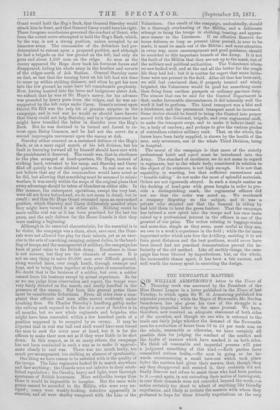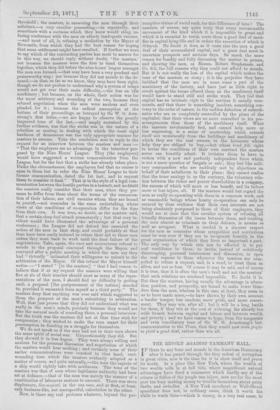THE NEWCASTLE MASTERS.
SIR WILLIAM ARMSTRONG'S letter to the Times or Thursday week was answered by the President of the- Nine Hours' League in a letter published in the Times of last Tuesday, to which again Sir W. G. Armstrong published his. rejoinder yesterday ; while the Mayor of Newcastle, Mr. Burdon Saunderson, has also given his view of the struggle in a. singularly impartial letter to the same journal. We have, therefore, now received an adequate statement of both sides. of the question, and though no one who is external to the- trade can fairly judge whether the demand of the Newcastle men for a reduction of hours from 59 to 54: per week was, on the whole, reasonable or otherwise, we have certainly all possible data for judging the conduct of the conflict and the faults of manner which have marked it on both sides. We think all reasonable and impartial persons will pass. a judgment something of this kind :—Both parties have committed serious faults,—the men in going so far to- wards countenancing a small turn-out which took place before the masters had given their answer, that, though they say they disapproved and resisted it, they certainly did not finally disavow and refuse to assist those who had been parties. to it ;—and again, in not extending their notice of turning out, in case their demands were not conceded, beyond the week,—a notice certainly too short to admit of anything like friendly. negotiation, and likely to irritate the masters with whom they professed to hope for these friendly negotiations on the very threshold ; the masters, in answering the men through their solicitors,—a very cavalier proceeding,—in repeatedly, and sometimes with a curtness which they knew would sting, re- fusing conference with the men on utterly inadequate excuses, —and most of all, in refusing a mediation by the Mayor of Newcastle, from which they had the best reason for hoping that some settlement might have resulted. If further we were to say which of the contending parties has most to answer for in this way, we should reply without doubt, 'the masters,' not because the masters were the first to band themselves together, which they did before the nine-hours' league amongst the men was formed,—that may have been a very prudent and praiseworthy step ; nor because they did not accede to the de- mand,—in that, as far as we know, they may have been right, though we do not profess to understand why a system of relays would not get over their main difficulty,—the loss on idle machinery ; but because, on the whole, their action was far the more arbitrary and wounding of the two, because they refused negotiation when the men were anxious and even pleaded for it ; because the radical assumption at the bottom of their proceedings, as betrayed by Sir W. G. Arm- strong's first letter,—we are happy to observe the greatly improved tone of the last,—and amply sustained by the further evidence, was that the strike was in the nature of a rebellion or mutiny, in dealing with which the most rigid hardness of demeanour was the only appropriate manner for masters to assume. Take the resolution sent in reply to the request for an interview between the masters and men :- " That the employers see no advantage in the interview pro- posed by the Nine Hours' League. They (the employers) would have suggested a written communication from the League, but for the fact that a strike has already taken place. Under the circumstances, the employers feel that no course is open to them but to refer the Nine Hours' League to their former communication, dated the 1st inst., and to request them to consider it final." That is in the style of a legal com- munication between the hostile parties in a lawsuit, and no doubt the masters really consider that their men, when they pre- sume to differ from them about the terms of the remunera- tion of their labour, are civil enemies whom they are bound to punish, —not comrades in the same undertaking, whose views of the conditions of co-operation differ for the time from their own. It was true, no doubt, as the masters said, that a certain shop had struck prematurely ; but that very in- cident would have illustrated the advantage of a personal conference ; the League did not defend but censured the action of the men in that shop, and could probably at that time have been easily induced to refuse their aid to these men unless they went bank to work until the final failure of the negotiations. Take, again, the curt and uncourteous refusal to accede to the proposal conveyed through the Mayor, and conveyed after a public meeting in which the men say they had " virtually " intimated their willingness to submit to the arbitration of the Mayor. Of this refusal the Mayor himself writes :—" I stated " [to the masters] " that I had reason to believe that if at my request the masters were willing that five or six of their number should meet as many of the repre- sentatives of the men, I should find no difficulty in getting such a proposal [the postponement of the notices] acceded to, provided it emanated from myself as a third party." The masters deny that anything was ever said which suggested to them the prospect of the men's submitting to arbitration. Well, that just proves that they did not understand what was really in the men's minds, precisely because they would not take the natural mode of sounding them, a personal interview. But the truth was the masters did not at that time wish for compromise ; they wished to make the men smart for their presumption in deciding on a struggle for themselves.
We do not speak as if the men had not in their turn shown the same spirit of social war. Unquestionably they did. But i they showed it in less degree. They were always willing and
anxious for the personal discussion and negotiation of which the masters would hear nothing ; and certainly none of their earlier communications were couched in that hard, curt, wounding tone which the masters evidently adopted as a matter of course, and quite naturally,—the tone the captain of a ship would rightly take with mutineers. The tone of the masters was that of men whose legitimate authority had been set at defiance,—that of the men was merely the manner of a combination of labourers anxious to succeed. There was stern displeasure, lase-majeste, in the one case, and at first, at least, only business-like, not unrespectful, calculation in the other. Now, is there any real pretence whatever, beyond the pre-
sumptive claims of social rank, for this difference of tone The
masters, of course, say quite truly that every unreasonable movement of the kind which it is impossible to grant and which it is essential to resist, costs them a good deal of sacri- fice in capital lying idle and in orders the execution of which is delayed. No doubt it does, as it costs also the men a good deal of their accumulated capital, and a great deal more in uncertain prospects and anxious days. So much the more reason for frankly and fully discussing the matter in person, and showing the men, as Messrs. Robert Stephenson and Co. did, the full reasons why they could not afford to accede. But it is not really the loss of the capital which makes the tone of the masters so stony ; it is the prejudice they have imbibed that the men are in some sense a part of the machinery of the factory, and have just as little right to revolt against the terms offered them as the machinery itself would have to stand still and strike work. They feel that capital has an intrinsic right to the services it usually com- mands, and that there is something insolent, something con- trary to the order of nature, in the sudden defection of subordi- nates who are so completely controlled by the plans of the capitalist, that their views are no more consulted in his pre- arrangements than those of the machinery itself. What the masters involuntarily feel, and cannot help more or less expressing, is a sense of mastership which extends itself not unnaturally from the buildings and machinery of which they are the real owners, to the labourers whose, help they are obliged to buy,—but whose bond fide right to revise the conditions of their own contract the masters never can heartily admit. It irritates them to have to reckon with a new and perfectly independent force which is not a mere question of bargain or sale ; they feel like mili- tary commanders who are suddenly met by objections on behalf of their subalterns to their plans ; they cannot realize that the truer analogy is, on the contrary, the voluntary rela- tion between the richer and poorer shareholders in a company, the success of which will more or less benefit, and its failure more or less injure, all. If the masters would but regard the men as really co-operating with them in a common work, and as reasonable beings whose hearty co-operation can only be secured by clear evidence that their own interests are not being absolutely postponed to those of their employers, they would see at once that this cavalier system of refusing all friendly discussion of the issues between them, and treating the mon almost as criminals on their defence, is unwise as well as arrogant. What is needed is a sincerer respect for the mon as comrades whose sympathies and convictions must be won over if they are to co-operate heartily in the great organization of which they form so important a part. The only way by which this can bo effected is to put real confidence in them, to invite, instead of sedulously discouraging, personal intercourse and discussion, to open the real reasons to them whenever the masters are com- pelled to refuse a request, and, in a word, to treat them as allies, and not as foes. Of course it may be said, and of course it is true, that it is often the men's fault and not the masters' that such relations are rendered impossible. No doubt it is.
But then the masters, having usually the advantage in educa- tion, position, and prosperity, are bound to make fewer blun-
ders than the men, whereas in this case, at least, they seem to
us to have made more,—to have shown by their own account a harder temper, less candour, more pride, and more resent-
ment. They may win, after all ; but it will be a long battle for them, if they win at the cost of widening the already too• wide broach between capital and labour and between wealth and poverty ; and we have reason to hope, from the temperate and even conciliatory tone of Sir W. G. Armstrong's last communication to the Times, that they would now even prefer to yield a good deal, rather than win all.































 Previous page
Previous page